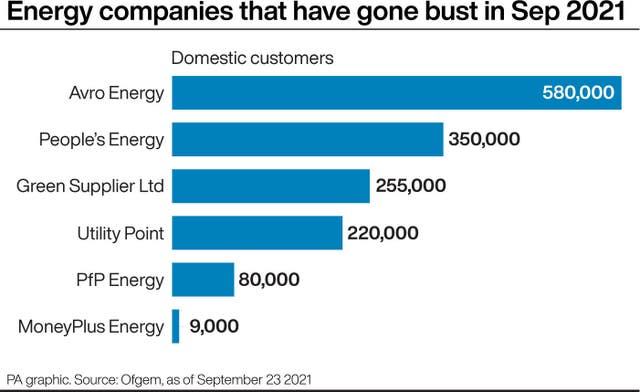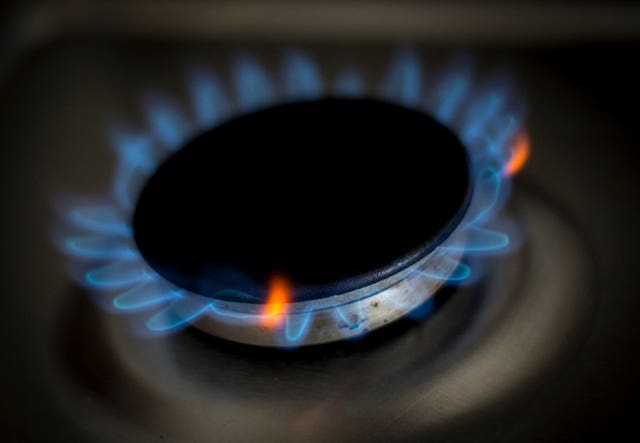
Iain Dale 7pm - 10pm
23 September 2021, 12:54

At least 1.5 million consumers have seen their suppliers go to the wall in recent weeks, so what happens if your firm goes bust?
Household finances are under pressure as some energy firms are pushed over the brink.
At least 1.5 million consumers have seen their suppliers go to the wall in recent weeks after the energy sector was hit by surging global wholesale gas prices.
Here is a look at how households could be facing a perfect storm of price pressures and what is happening in the energy sector:
– What is happening to energy bills?
A spike in global gas prices is pushing up the cost of energy significantly.
Regulator Ofgem regularly sets an energy price cap, which acts as a “backstop” protection for customers on default tariffs and the cap will increase to £1,277 from October 1 for a typical user.
Customers coming off cheap deals face being bumped up to the level of the price cap, which could mean paying hundreds of pounds more annually.
The cap is based on what has already happened in the underlying energy markets, and so it is expected to jump again next April.
Consumer champion Martin Lewis suggested earlier this week that from April 1 the cap could jump to over £1,500 a year.
It has also been suggested that people living in northern regions could particularly suffer from the price hikes, with temperatures often colder there.
– What has happened to energy firms already?
The number of collapsed companies accounts for more than 5% of the market.

Avro became the biggest of a series of recent failures in the energy market on Wednesday. Green – which also closed on Wednesday – PFP, MoneyPlus, Utility Point and People’s Energy have all exited the supply market in just over two weeks. Last month HUB Energy stopped trading.
– What about other energy firms?
It is thought more firms could be tipped over the edge. Some have stopped taking new customers.
With a smaller number of firms expected to be operating, it has been suggested that major players British Gas, Scottish Power, E.On and EDF could potentially benefit from reduced competition, as well as some of their bigger challengers.
– What happens if my energy firm goes bust?
Regulator Ofgem will protect any credit balance customers have and appoint a new supplier. However the new deal could be significantly more expensive, given the current situation.
Ofgem advises that if a firm does go bust, consumers can take a meter reading and wait for it to appoint a new supplier.
When people are contacted by their new supplier they can ask to be put on the cheapest tariff – or switch without paying exit fees.
– Will we go back to a 1970s situation of blackouts?

Ministers have said there is no risk of the lights going out this winter, as energy supplies are secure despite the rising costs.
– What about my supermarket shop?
There are concerns that shoppers could start panic-buying, particularly with Christmas on the horizon.
The National Farmers’ Union (NFU) has called for an urgent Covid Recovery Visa to allow firms to recruit from outside the UK to alleviate “crippling” labour shortages across the supply chain.
The Government has said the UK has a highly resilient food supply chain, which has coped well in responding to unprecedented challenges.
It said it is working closely with industry to understand labour demand and supply.
– What else is making life tough financially right now?
Living costs have already picked up. The Consumer Prices Index (CPI) measure of inflation was running at a nine-year high in August. Experts previously predicted the 3.2% increase could accelerate to more than 4% by the end of the year.
The Consumer Prices Index including owner occupiers’ housing costs grew 3% in the year to August 2021, up from 2.1% in July.
Driven by falls last August due to the Eat Out to Help Out scheme, the rise will likely be temporary https://t.co/yHZcoQVSVd pic.twitter.com/jE0R9TT3x3
— Office for National Statistics (ONS) (@ONS) September 15, 2021
Many households are also still trying to repair the financial damage caused by the coronavirus crisis. Some are carrying higher debts than they would have otherwise had, after taking payment holidays to combat the immediate financial threat from the pandemic. According to UK Finance figures, the average value of suspended mortgage payments per month was £755.
Many people still face jobs uncertainty, including some energy firm workers.
Sarah Coles, personal finance analyst at Hargreaves Lansdown, said: “At the end of August, between 1.3 million and 1.7 million people were thought to be on furlough…
“There’s always the hope that employers are just waiting for the end of the scheme to bring people back, but it means hundreds of thousands of people are still stuck at home, worrying about their future, and watching the clock count down to the moment when furlough support vanishes altogether.”
– What is happening in the near future?
A £20-a-week uplift in Universal Credit payments is scheduled to end on October 6 – with some 4.4 million households on Universal Credit also poised to see their energy bills rise significantly in October.
– Anything else on the horizon?
Looking further out, a £12 billion tax hike is also on the horizon to help fund social care reforms. A 1.25 percentage point increase in national insurance will be introduced from April 2022.
– Who else will be keeping a careful eye on what is happening?
AJ Bell investment director Russ Mould said that, alongside consumers, investors and central bankers will also be “looking nervously at the price of food, amid shortages of truckers, container ships and carbon dioxide”.
He said: “Investors will be interested – even concerned – to ascertain whether food prices will be the source of a sustained bout of inflation and one which may do damage to consumers’ ability and desire to spend.
“Central bankers will be watching, in case inflation forces their hand and requires a tightening of monetary policy in the form of a tapering of quantitative easing and higher interest rates.”
Investors may want to monitor the global political situation too, he added, as food shortages and soaring prices have sparked upheaval in the past.
– So what can households do to try to offset rising costs?
Shopping around and comparing energy deals is still important, although with so many prices rising it is likely to be a much tougher task than usual.

MoneySavingExpert.com has a Cheap Energy Club which helps people to find deals to suit their needs from across the market.
People could try to find a fixed rate deal to lock into, or they could rely on the protection of the price cap and hope the situation may improve.
There are also various support schemes available such as Winter Fuel Payments and the Warm Home Discount.
Ofgem has information about the support available at www.ofgem.gov.uk/energy-advice-households/find-schemes-grants-and-benefits-help-home-energy .
– Any other ways households could cut back and make savings?
There may be ways to make small savings which will build up over time. For example, timing supermarket shops to coincide with times of day when items are being marked down, or making packed lunches rather than buying lunch out.
Following mortgage price wars in recent months, homeowners could see if they could cut their monthly costs by switching their mortgage.
Several banks also have current account cash switching offers of £100-plus, which could also give household budgets a cash injection.
The Government-backed MoneyHelper service has budgeting guides at www.moneyhelper.org.uk/en/everyday-money/budgeting .